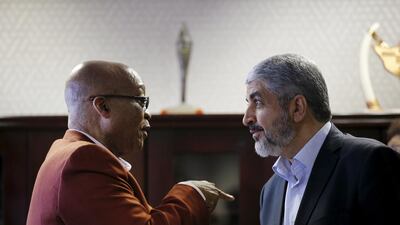South Africa’s relationship with the Israeli-Palestinian conflict is a long and conflicted one. During the later years of apartheid, Pretoria established extensive military and commercial ties with Tel Aviv. According to South African state archives, Israel and the apartheid regime carried out joint research on nuclear weapons, fought communist regimes in southern Africa, and enjoyed deep commercial ties that even included Israeli businessmen assisting their South African counterparts to undermine international boycotts.
Part of the process of unravelling apartheid's infrastructure in 1994 was changing the nature of the country’s alliance with Israel. This has happened but the residue of years of cooperation remains and forms the basis for a domestic political fight.
Last month, South Africa’s ruling African National Congress (ANC) welcomed senior Hamas leaders on an official visit. Khaled Meshaal, head of Hamas’s political bureau, was received by South African president Jacob Zuma, who signed a memorandum of understanding – as ANC president, not as the president of South Africa – establishing a party-to-party relationship between the ANC and Hamas. Mr Meshaal toured South Africa giving speeches, which drew heavily on the similarities between apartheid South Africa and Israel. Other Hamas leaders met ANC politicians to discuss the blockade of Gaza and the possibility of opening an office in the country, which would amount to an incredible diplomatic victory for Hamas.
______________________________________________________________
Read more about post-apartheid South Africa and the Middle East:
■ Post-apartheid, inequality still rules in South Africa
■ Tunisia begins to reconcile itself with its grim past
______________________________________________________________
For many ANC leaders, including a number of former South African ambassadors to Israel and the Palestinian Authority, Hamas is a liberation movement and not the terrorist organisation the international community labels the group.
In defending their logic, they like to point to the ANC’s armed activities during the struggle. In 1961, Nelson Mandela established an armed wing of the ANC called Umkhonto we Sizwe (MK). While MK largely avoided targeting civilians, the movement did sabotage critical state infrastructure like power plants throughout South Africa during its fight for liberation.
It is convenient for the ANC to deepen its relationship with Hamas at this moment of political uncertainty. The party is desperate to reclaim its reputation as a liberation movement despite having ruled post-apartheid South Africa for two decades. Recent student protests against university fee increases, endemic corruption at the highest levels of government, and growing economic inequality have led to a crisis of leadership for the ANC and the country.
Recycling struggle rhetoric and welcoming groups like Hamas is part of a larger strategy by the ANC to demonstrate its liberation credentials while establishing a firmly independent South African foreign policy. But this is not happening in a vacuum; the Israeli-Palestinian conflict has become a political wedge issue in domestic South African politics.
This should not come as a surprise. Apartheid in South Africa is regularly used as a way to understand Israel’s control over Palestinians. In both cases, settler colonial regimes created and maintained unequal and discriminatory systems of government that subjugated the indigenous people.
The apartheid regime, like Israel today, was dependent on foreign investment and partnerships given the size and geographical isolation of the country. An international non-violent boycott of apartheid South Africa was one of the most efficient ways to dismantle its power.
The same is true for Israel and for many South Africans the history of their struggle for liberation is why they support the Palestinians. Unsurprisingly, the global movement to boycott, divest from and sanction (BDS) Israel over its apartheid system is inspired by the boycott of apartheid South Africa and has an important branch in the country.
Yet, South African support for the Palestinians is not an open and closed case. This is largely due to the ANC’s mismanagement and demographics. While the South African Jewish community is small compared to other communities around the world, it remains one of the strongest supporters of Israel in the world, at least when it comes to per capita donations to Tel Aviv.
Seeing an opportunity to attack the ANC, the main opposition party, the Democratic Alliance (DA), which enjoys large Jewish support, has been arguing that the South African government is wrong on the Palestine issue. The recent visit by Hamas has been cast by the DA as the ANC doing more harm to South Africa’s international standing, which has taken a beating after the ANC said the country should leave the International Criminal Court.
In the same way the Palestine conflict is debated in the United States, the issue now goes far beyond foreign policy in South Africa. It has become a way to gain political clout. The ANC uses its support for Hamas to show that it remains a liberation movement, while the DA says the ANC is not fit to govern and is sending South Africa down an isolated path.
Recently, the ANC said it would seek legislation to strip the citizenship of South Africans who had fought in the Israeli army. At the same time, the DA has sent some of its politicians on well-publicised trips to Israel sponsored by the pro-Israel South Africa-Israel Forum. In this frenzied atmosphere, the ultimate losers are the Palestinian people because the issue is becoming a domestic one for South African.
While the ANC has maintained ties with Hamas for years, South Africa has also continued to maintain military cooperation and other ties with Israel. If the ANC wants to help the Palestinian struggle, it would make sense to embrace the position of the boycott movement and work to predicate its ties with Israel on a resolution of the conflict that gives Palestinians their full rights. ANC leaders know better than most how efficient non-violent boycotts are in the struggle for liberation. They should act accordingly and not throw away the critical role South Africa should play in Palestine because of domestic bickering.
jdana@thenational.ae
On Twitter: @ibnezra

